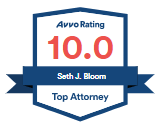Common Reasons Hurricane Insurance Claims Are Delayed or Denied

Why do storm insurance claims take forever or get rejected?
Every hurricane season, families and businesses across Louisiana brace for the damage storms can bring. From high winds ripping off roofs to devastating floods, the aftermath is often overwhelming. You pay your insurance premiums for years, expecting coverage when you need it most. Yet, all too often, policyholders in New Orleans, Metairie, Jefferson Parish, and St. Tammany Parish find their hurricane claims delayed or outright denied.
Nothing is more frustrating than fighting with your insurance company after a storm. Understanding the most common reasons claims are delayed or denied is the first step toward protecting yourself and knowing when to get legal help.
At Bloom Legal Network, we connect homeowners and business owners with experienced hurricane insurance attorneys who know how to push back against insurers and fight for the full compensation you deserve.
Why Hurricane Claims Get Complicated in Louisiana
Louisiana’s unique geography makes it one of the most hurricane-prone states in the country. From New Orleans to St. Charles Parish, storms leave behind billions in damage almost every year. After a major hurricane, insurance companies face thousands of claims at once, creating a perfect storm for delays.
But these delays aren’t just about red tape. Insurers often use them to pressure policyholders into accepting a lower settlement. Delays can leave you without the resources to repair your property, cover temporary housing, or get your business back on its feet. That’s why it’s critical to understand the tactics insurers use and why so many valid claims get stuck or denied.
📞 If your hurricane insurance claim is being delayed or denied in Southeast Louisiana, contact Bloom Legal Network. We’ll connect you with attorneys who understand how to hold insurers accountable.
Top Reasons Hurricane Claims Are Delayed or Denied
1. Disputes Over Coverage
One of the most frequent reasons for a claim denial is a disagreement over what your policy actually covers. Insurers may argue that:
- Wind damage should be separated from flood damage. Standard homeowner’s policies usually exclude flood damage, which requires a separate flood insurance policy. However, insurers may try to classify wind-driven rain as floodwater to limit their payout.
- Certain repairs are “maintenance issues” rather than storm-related damage.
- Policy exclusions limit what they have to pay.
For example, a Jefferson Parish homeowner might file a claim for roof damage after Hurricane Ida. The insurer could argue that part of the problem was “wear and tear”—not storm impact—to avoid paying the full claim.
2. Allegations of Late Reporting
Most insurance policies require you to report damage “promptly.” After a major hurricane, however, it’s often impossible to get everything documented right away. Insurers may use delays in reporting—even when caused by power outages, evacuation orders, or lack of access to your property—as a reason to limit or deny your claim.
3. Insufficient Documentation
Photos, repair estimates, receipts, and inspection reports are crucial. If the insurer says you haven’t provided enough proof, they may stall your claim indefinitely. In places like Metairie or St. Tammany Parish, where widespread flooding complicates damage assessments, this is a common excuse. Working with a lawyer can help ensure your documentation is thorough and that insurers can’t use technicalities to hold up payment.
4. Disputes Over the Cost of Repairs
Even when insurers accept that your property was damaged, they may downplay the extent or cost of repairs. They might argue that only part of a roof needs replacement when the entire structure is compromised. This can result in lowball offers far below what it will actually take to fix your home or business.
5. Accusations of Pre-Existing Damage
Another common tactic is blaming storm damage on prior conditions. A cracked foundation in New Orleans or minor leaks in a St. Charles Parish home can suddenly be cited as “proof” that your claim isn’t fully hurricane-related. This strategy shifts responsibility away from the insurer, leaving policyholders footing the bill.
6. Claim Backlogs
After large hurricanes, thousands of claims pour in at once. Insurers often cite “overwhelming volume” as the reason for months-long delays. Unfortunately, these backlogs hurt families most when they need help right away.
How Louisiana Policyholders Can Protect Themselves
Hurricane insurance claims aren’t just paperwork—they’re about your home, your business, and your ability to recover. In areas like Jefferson Parish and St. Tammany Parish, where storms strike hard, knowing your rights makes all the difference.
Steps you can take include:
- Report your claim as soon as possible, even if you don’t have all documentation yet.
- Take extensive photos and videos of all damage before making temporary repairs.
- Keep receipts for every expense, from hotel stays to supplies.
- Get your own independent repair estimates to challenge lowball offers.
Still, even the most careful policyholders face delays and denials. That’s where a Louisiana hurricane insurance attorney comes in. Bloom Legal Network connects you with lawyers who know how to:
- Challenge wrongful denials and lowball offers.
- Demand a fair valuation of your losses.
- Push insurers to honor their obligations.
The Legal Deadlines You Can’t Ignore
Louisiana law gives you a limited time to file and enforce hurricane insurance claims. Missing these deadlines can mean losing your right to compensation entirely. Insurance companies know this and sometimes use delays as a tactic to run out the clock.
Don’t wait. The sooner you act, the better your chances of recovering full compensation. Bloom Legal Network works with attorneys who understand both the timelines and tactics insurers use in hurricane claims across Southeast Louisiana.
📞 If your hurricane insurance claim is delayed or denied in New Orleans, Metairie, or anywhere in Southeast Louisiana, call 504-599-9997 or email info@bloomlegal.com. Don’t let insurance companies dictate your recovery—get legal help that puts you back in control.
FAQs About Hurricane Insurance Delays and Denials
1. Why do insurance companies delay paying hurricane claims in Louisiana?
Insurance companies often cite high claim volume, lack of documentation, or questions about coverage to justify delays. In reality, delaying payments can also benefit insurers financially by pressuring policyholders into accepting lower settlements. Louisiana residents, especially in New Orleans, Jefferson Parish, and St. Charles Parish, regularly face these tactics after major storms.
2. Can my hurricane insurance claim be denied for flood damage?
Yes, and this is one of the most common issues. Standard homeowner’s policies usually exclude flood damage, which must be covered by a separate flood insurance policy. However, insurers sometimes blur the line between wind-driven rain (which should be covered) and floodwater (which may not be). An attorney can help challenge these interpretations to ensure you receive the coverage you’re entitled to.
3. What should I do if my hurricane insurance claim is denied in Southeast Louisiana?
First, carefully review the denial letter to understand the insurer’s stated reasons. Next, gather all your documentation—photos, receipts, repair estimates—and compare it with your policy language. Finally, consider legal representation. A hurricane insurance attorney can help you appeal the denial, negotiate with the insurer, or file a lawsuit if necessary. Bloom Legal Network connects policyholders across New Orleans, Metairie, and St. Tammany Parish with lawyers experienced in fighting insurance denials.






